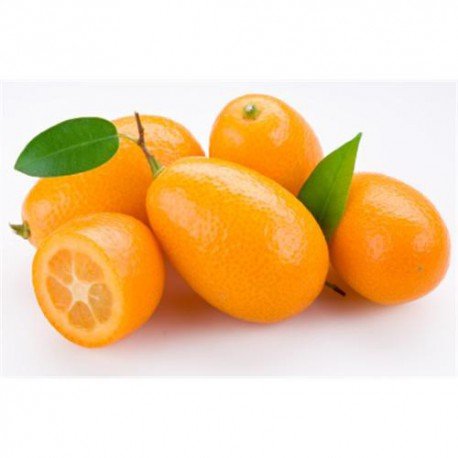Kumquat and its benefits
source

The kumquat (of the Chinese golden orange) is a tropical fruit of yellow orange color of the family of the citrus perennial. This fruit has other names - Kinkan and Fortunella. Outwardly, the kumquat looks like a very small oval orange. In length it reaches a maximum of 5 cm, and in width - 4 cm. The fruit is completely consumed with the skin. The flavor of the fruit is very close to the bitter tangerine, but at the same time the peel has a bittersweet taste.
The kumquat is the home of the southern part of China. The first literary mention of Kumquat dates back to the 12th century. in china Fruits arrived in Europe thanks to the English botanist Robert Fortune, who brought them to the annual Horticulture Exhibition in London in 1846. Initially, the fruit was classified as a genus of citrus fruits, but in 1915 they were assigned to a separate subgenre, Fortunella. Kumquat plantations grown for export are located in Southeast Asia, China, Japan, Greece and the southern territories of the United States. There are several types of kumquat: Hong Kong, Malay, Marumi, Maiva, Nagami and Fukushi.
When buying kumquat you have to pay attention to its appearance. The shell should have an intense orange color, be bright, smooth and without visible mechanical damage, dark spots and cracks. In addition, the fruit should be moderately soft. Excessive softness may indicate excessive maturation of the fetus, and hardness may indicate immaturity. Store the kumquat in the refrigerator in the fruit and vegetable department for three weeks. But before this, the fruit must be completely rinsed of the contamination and dried so that there is not a drop of moisture on the surface. If whole fruits or processed into mashed potatoes are placed in a freezer at a temperature of -15 to -19 ° C, then useful substances can be stored for up to six months.
The kumquat is widely used in the kitchen. In most cases, it is consumed raw and used to decorate dishes: salads, sandwiches, appetizers, cocktails, mulled wine and as an appetizer for strong alcoholic beverages. In thermally processed dishes, kumquat is used to prepare bittersweet sauces for vegetables and meat, for baked meat or fish, and also for making desserts: stews, jams, juices, cottage cheese and yogurt, stews, etc.
The product is characterized by a fairly low calorie content, since 100 g of this fruit contains 71 kcal, however, it is not recommended to abuse it to a great extent, since it can cause obesity due to the high content of carbohydrates, especially in dry form. In 100 g of such kumquat - 284 kcal.
Kumquat contains a fairly diverse set of vitamins (C, A, E, B1, B2, B3, B5, B6), minerals (calcium, potassium, iron, copper, magnesium, sodium, phosphorus, zinc), fatty acids and oils essentials . The high concentration of vitamin C in the fruits of kumquat makes it indispensable to improve the immunity and the general resistance of the body to viruses and bacteria.
Due to the content of fiber, pectin and natural enzymes, fruits are used to normalize the work of the gastrointestinal tract, prevention of gastritis and ulcers. Favorably the kumquat acts on the nervous system. People who use this fruit are less susceptible to depression, irritability, nervousness and chronic stress. It helps to increase emotional sensitivity, to get rid of apathy, to strengthen vigorous activity and not to passive existence. The fruit is used in the fight against parasites and fungi. The antifungal properties of kumquat are due to the presence in its composition furakumarina.
It is this substance that helps fight inflammatory and infectious diseases. In oriental medicine, dried kumquat peel is used to treat colds, flu, rhinitis and cough. To do this, pass the crusts prepared by inhalation 2-3 times a day. This method of using kumquat allows essential oils to be freely released and absorbed as much as possible by the oral mucosa.
Kumquat is among dietary products that help break down and eliminate bad cholesterol, cleanse the body of toxins, radionuclides and heavy metals. The cleaning of the blood vessels of the fat plates, which occurs during the systematic use of the kumquat, is an excellent prevention of strokes, heart attacks and atherosclerosis.
The use of kumquat is not recommended for people who suffer an increase in stomach acidity or kidney diseases, as it can cause exacerbations of these diseases. In addition, it is not desirable during pregnancy and lactation, as it can cause allergies in the child.
Do you know that The high concentration of vitamin C in the fruits of kumquat makes it indispensable to improve the immunity and the general resistance of the body to viruses and bacteria.
Resteem